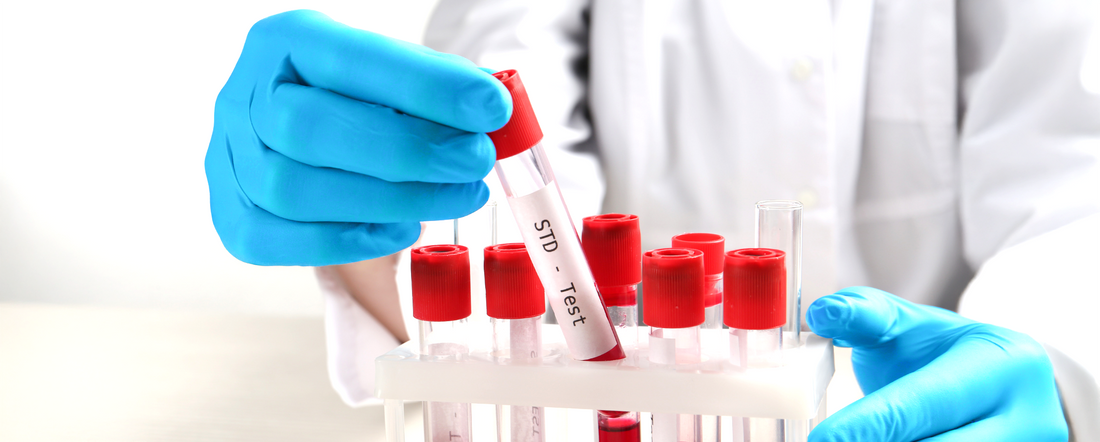
Testing for Sexually Transmitted Infections
Share
A sexually transmitted infection (STI) is caused by an infection that is passed on from person-to-person through unprotected sex, foreplay or any sexual activity. The four most common sexually transmitted infections are Chlamydia, Gonorrhoea, Syphilis and Genital Herpes. STI’s are passed on through vaginal, oral, anal sex, skin-to-skin contact as well as sharing sex toys. While most sexually transmitted infections can be treated, without treatment they can lead to long-term health problems which is why we recommend having an STI test after every partner or at least once a year. The best way to protect yourself from catching an STI is to wear a condom or dam every time you have oral sex or sexual intercourse.
Let’s find out more about the symptoms of an STI, why you need an STI test, what happens at a sexual health clinic, what the test involves and how to protect yourself from sexually transmitted infections.

What are the symptoms of an STI?
Sometimes, there are no symptoms with a sexually transmitted infection but if you do have any, they can range from:
- Unusual discharge
- Rash
- Soreness
- Pain when having sex
- Pain or swelling of the testicles
- Spotting during periods
- Pain when passing urine
- Sores or ulcers on the genitals
If you do suspect you have symptoms of a sexually transmitted infection, make sure you book an STI test appointment at your local sexual health clinic.
Why should I get tested?
It’s important to have regular sexual health screens because many STI’s don’t have any symptoms at all. If a sexually transmitted infection is left untreated, it can lead to long-term health conditions, such as pelvic inflammatory disease, painful testicles or infertility.
Not only that, if you have an STI and have sex with another person, you are then transferring the infection to someone else. That’s why we recommend having an STI test after every partner or at least once a year.
Where can I get tested?
There are many places to get tested for sexually transmitted infections. You can get tested at your local sexual health clinic, your GP, pharmacy, young people services or through an online testing service.
What happens when I visit a sexual health service?
Getting tested for sexually transmitted infections is a fairly simple process. You phone up and make an appointment, or sometimes they hold a drop-in service where you can just turn up without the need for an appointment. The service is completely confidential and they may ask you the following questions:
- Your personal details, name, address, date of birth, contact details
- When you last had sex
- If you’ve ever had unprotected sex
- If you have any symptoms
-
If you suspect you might have an STI
What does the test involve?
If you are testing for Chlamydia and Gonorrhoea - it’s usually a self-taken swab or urine sample, while testing for HIV and Syphilis requires a blood test.
If you attend for a full STI test at a clinic, they may also do an examination of your genitals or take some swabs from the urethra or cervix.
For some tests, you may have the result back the same day - but for others, they will need to be sent away to a laboratory. When the results come back, you will receive a text message or a phone-call with your results, which may take up to 14 days to come back - the nurse will explain this to you at the appointment.
What happens if a positive test is found?
If a positive test is found, you will be asked to go to the sexual health clinic to talk about your STI test and any course of treatment. Don’t worry though, most STI’s are cured with antibiotics but you will need to tell your current sexual partner or any ex-partners so they can be tested and treated too. If you prefer, the clinic can contact them for you confidentially, and will never reveal who you are.
How do I protect myself from catching sexually transmitted infections?

Condoms! Condoms reduce the risk of catching sexually transmitted infections by preventing any sexual fluids from being transferred. By using a condom (or dam) every time you have vaginal, anal or oral sex reduces the risk of contracting an STI. We have a wide variety of condoms available from regular, king, Super King, Trim well as flavoured and fun condoms so there’s plenty of variety available. We also have latex free for those that have a latex allergy, internal condoms as well as dams.
Unsure which condom to choose? Open this link 'in a new window' here What type of condom should I buy?
As well as ensuring you or your partner wear condoms, getting a sexual health screen on a regular basis (we recommend annually or on change of a sexual partner) will help reduce the risk of catching and passing the infection on.



